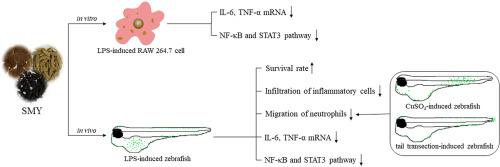Journal of Ethnopharmacology ( IF 4.8 ) Pub Date : 2020-10-19 , DOI: 10.1016/j.jep.2020.113497 Yuanru Zheng , Chunyang Tian , Chunlin Fan , Nishan Xu , Junjie Xiao , Xiaoyang Zhao , Zibin Lu , Huihui Cao , Junshan Liu , Linzhong Yu

|
Ethnopharmacological relevance
Sheng-Mai Yin (SMY), a famous traditional Chinese medicine formula, has been commonly used in China for centuries to treat various diseases, such as inflammation-related diseases. However, the anti-inflammatory activity of SMY and its potential mechanisms still have not yet been clearly understood.
Aim of the study: In this study, we aimed to determine the anti-inflammatory effect of SMY and explore its underlying mechanisms both on RAW 264.7 cells and zebrafish.
Materials and methods
The levels of pro-inflammatory cytokines IL-6 and TNF-α secreted by RAW 264.7 cells were measured by ELISA. The protein expressions of IκBα, p-IκBα (Ser32), STAT3 and p-STAT3 (Tyr705) were determined by Western blotting. And the nuclear translocation of NF-κB p65 in LPS-induced RAW 264.7 macrophage cells was detected by confocal microscopy. Moreover, the in vivo anti-inflammatory effect of SMY and its potential mechanisms were further investigated by survival analysis, hematoxylin-eosin staining (H&E), observation of neutrophil migration and quantitative real-time PCR (qRT-PCR) analysis in zebrafish inflammatory models.
Results
SMY reduced the release of IL-6 and TNF-α, inhibited the phosphorylation of IκBα and STAT3 as well as the nuclear translocation of NF-κB p65 in LPS-induced RAW 264.7 cells. Furthermore, the increased survival, decreased infiltration of inflammatory cells and the attenuated migration of neutrophils together suggested the in vivo anti-inflammatory effects of SMY. More importantly, SMY reduced the gene expressions of pro-inflammatory cytokines and suppressed LPS-induced up-regulation of NF-κB, IκBα and STAT3 in zebrafish inflammatory models.
Conclusion
SMY exerts significant anti-inflammatory effects with a potential mechanism of inhibiting the NF-κB and STAT3 signal pathways. Our findings suggest a scientific rationale of SMY to treat inflammatory diseases in clinic.






























 京公网安备 11010802027423号
京公网安备 11010802027423号